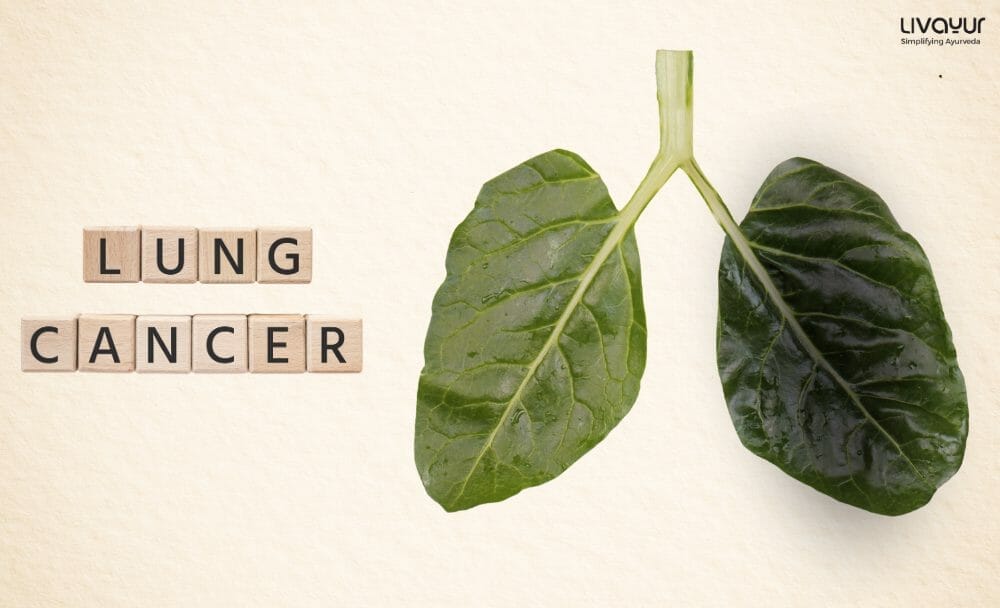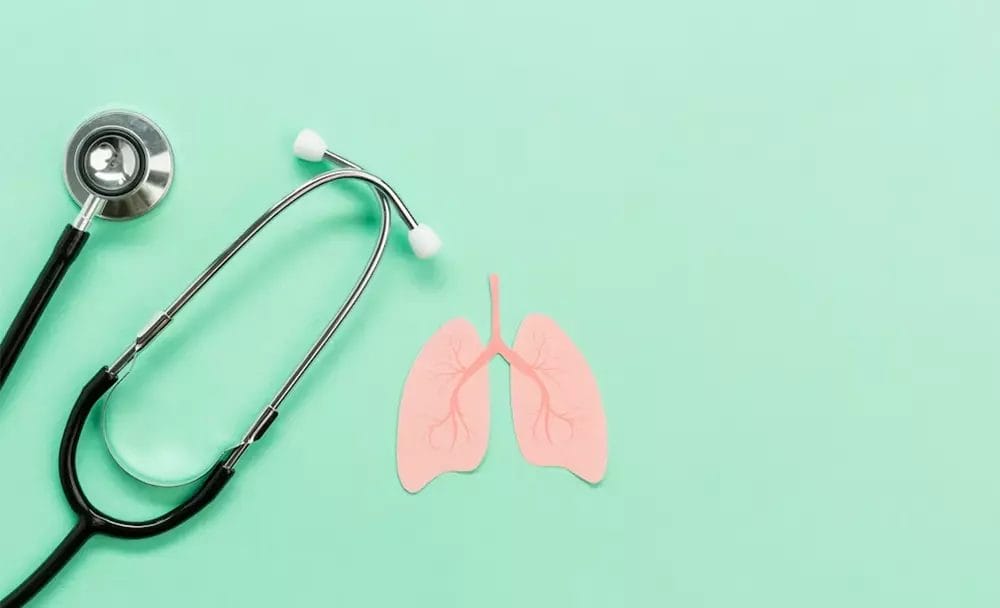This article is reviewed by an expert
Are you suffering from lung cancer? If yes, then you have come to the right place.
In this article, let’s find out everything you need to know about the disease and its management through Ayurveda and see how you can benefit from it.
Lung Cancer & Its Types (1)
Also known as lung carcinoma, lung cancer is a type of malignant lung tumour responsible for more than 25% of all cancer deaths.
There are two main histopathological types of lung cancer: small-cell lung cancer (SCLC) and non-small-cell lung cancer (NSCLC). The latter accounts for 85% of all lung cancer cases and is further divided into three subtypes: adenocarcinoma (ADC), squamous cell carcinoma (SCC), and large cell carcinoma (LCC).
Stages of Lung Cancer (2)
The staging for lung cancer ranges from Stage 0 (in situ) to Stage IV (cancer has spread to other organs).
However, it is usually determined by the size and spread of the tumour. For example, a Stage III cancer may have a smaller primary tumour than a Stage II cancer, but other factors put it at a more advanced stage.
In addition to using the traditional staging method, small cell lung cancer can also be classified as a limited or extensive stage depending on whether it can be treated with a single radiation field. Limited-stage SCLC is confined to one lung, while extensive-stage SCLC has spread throughout one or both lungs and other parts of the body.
Causes of Lung Cancer (1)
Common causes and risk factors for lung cancer include:
- Smoking
- Exposure to passive smoking
- Exposure to radon gas
- Exposure to asbestos and other carcinogens
- Family history of lung cancer
The pathophysiology of lung cancer is complex and not fully understood. It is hypothesised that repeated exposure to carcinogens, particularly cigarette smoke, leads to dysplasia of lung epithelium. This, in turn, promotes carcinogenesis.
Symptoms of Lung Cancer (1)
Lung cancers typically do not cause symptoms until the disease has reached an advanced stage.
However, some common symptoms include:
- A new cough that is persistent or worsens
- Cough that produces blood
- Pain in the chest
- Back or shoulder pain that worsens during coughing
- Laughing or deep breathing
- Shortness of breath that comes on suddenly and occurs during everyday activities
- Unexplained weight loss
- Feeling tiredness
- Loss of appetite
- Lung infections such as bronchitis or pneumonia, hoarseness or wheezing.
Diagnosis of Lung Cancer (1)
The diagnosis of lung cancer is mainly based on medical history, symptoms, and physical examination, along with imaging tests, such as computed tomography (CT) scan, positron emission tomography (PET) scan, and bone scan.
Other procedures used to diagnose lung cancer include bronchoscopy biopsy, endobronchial ultrasound (EBUS), endoscopic esophageal ultrasound (EUS), mediastinoscopy and mediastinotomy, thoracentesis, thoracoscopy or video-assisted thoracoscopic surgery (VATS) biopsy, sputum cytology, fine-needle aspiration (FNA) biopsy, and open biopsy.
Treatment of Lung Cancer (1)
The treatment for lung cancer depends on the cancer’s specific cell type and how far it has spread.
Common treatments include palliative care, surgery, chemotherapy, and radiation therapy.
Ayurveda also provides many herbs and remedies that can be used to aid the treatment of lung cancer.
Ayurvedic Perspective of Lung Cancer (1)
Charaka and Sushruta Samhitas describe cancer as either inflammatory or non-inflammatory swelling and mention them as either Granthi (minor neoplasm) or Arbuda (major neoplasm).
According to Ayurveda, malignant tumours are very harmful because all three major bodily systems lose mutual coordination and thus cannot prevent tissue damage, resulting in a deadly morbid condition.
Ayurveda says that cancer originates due to a metabolic crisis, i.e., aggravation of Vata forces and suppression of Kapha forces, both interacting with one another and resulting in proliferation.
The aim of Ayurvedic treatment is to control the underlying cause of cancer, improve the quality of life, detox the body after chemotherapy, boost immunity and prevent relapse.
Ayurvedic Herbs To Prevent & Support The Treatment of Lung Cancer (1)
Black Seeds
Owing to its antioxidant, anti-inflammatory, and antibacterial properties, Nigella sativa (N sativa) or black seeds are considered one of the best herbs for lung cancer.
Swarna Bhasma
Ayurveda strongly proposes the use of Swarna Bhasma in treating several types of cancers like rectal, lung, and liver.
Ashwagandha
Rich in antioxidant and anticarcinogenic properties, W. somnifera (L.) or Ashwagandha helps treat immune dysfunction.
Several studies have also shown that root extracts of Withania Somnifera exhibit cytotoxic properties against lung, colon, central nervous system, and breast cancer cell lines, thereby aiding in the treatment of cancer.
Curcumin
Curcumin or haldi exhibits potent anti-metastatic effects by decreasing the invasiveness of cancer cells. Therefore, it’s one of the most popular Ayurvedic herbs for treating lung cancer.
The Final Takeaway
Lung cancer is a serious condition responsible for a significant number of cancer deaths. It is caused by a variety of factors, including smoking, exposure to carcinogens and genetics.
Ayurveda identifies several herbs, such as black seeds, Swarna Bhasma, Ashwagandha, curry tree, and curcumin, with potent anticancer effects that can be used to aid the treatment of lung cancer. They can help detox the body after chemotherapy, boost immunity, improve the quality of life and prevent relapse. However, you must always consult an Ayurvedic practitioner before using any herb or remedy.
Disclaimer: The information provided in this article is for general awareness and not meant to substitute any medical advice. Please consult an Ayurvedic healthcare professional for medical advice.
References
- https://ijmpronline.com/download/article/460/1627629816.pdf
- https://my.clevelandclinic.org/health/diseases/4375-lung-cancer


















